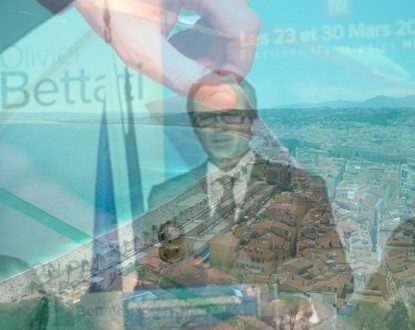Proposals continue to pour in ahead of the municipal elections. Each candidate wants to attract voters with their vision of the city’s future. It was Olivier Bettati’s turn, the most atypical among them, to present and discuss his economic ideas.
And surprise was in the air! Until now, economic development was planned for the West (due to Plaine du Var and OIN), but the candidate of the third way (His motto is “Ideas are neither right nor left but good or bad”) changes the game and focuses on the East.
Explanations…
For Olivier Bettati: “The OIN (Operation of National Interest) does not work. The company in charge does not have the necessary land footprint to undertake any project. We need to completely reconsider the ‘Eco-Valley’ project. We are unable to build housing for workers at reasonable prices, 4,000 euros per square meter. To develop this area, the offer of public transport is far too low and poorly adapted (editor’s note: Christian Estrosi plans the tram after 2017).
Our territory struggles to attract new businesses, and we cannot settle for a structure that cannibalizes its neighbors, as with IBM moving from La Gaude to Nice. Moreover, ongoing real estate operations are aimed at constructing office buildings while demand stagnates.
Conclusion: we’re left with only commercial initiatives, further jeopardizing traditional and local commerce.”
So? Well, the focus is on the East (already equipped with line 1 of the tramway and 10 minutes from downtown) with plans for a massive trade fair hall on the current Saint Roch station grounds, with logistics handled by SNCF, the creation of parking, and the possibility of selling building rights to hotels in the area to fund the construction of the hall.
Why a trade fair hall in the East when the outgoing mayor plans it on the lands freed by the MIN, which will itself move to Baronne and be near the future multimodal station of Saint-Augustin? Simply because Olivier Bettati does not believe a high-speed line to Nice is feasible.
Moreover, business tourism, strictly linked to the activity of fairs and professional exhibitions, is the promising niche of tourism, aligning with a better utilization of the hotel park and commercial activity given its spending capability, more than double that of classic tourism (200 euros per day versus 82).
Of course, international competition is fierce, but, above all, you must have the means for your ambitions and then clearly know which client base to target.
And isn’t it better to come to Nice for a few days than to Frankfurt?
As one cherry draws another, the commercial offer must be renovated…
“The first thing to do, to help our shopkeepers in their development and finally create the necessary conditions for customers to feel good in the city center, is to launch a major road investment plan that includes sidewalk refurbishment and improved public lighting in the city. This major plan would be made possible by savings from canceling the tunnel for Tramway Line 2 (estimated at 600 million euros, while the official figure from the outgoing mayor is around 300 million).” Adds Olivier Bettati.
The East of the city will also be the site of a second real estate operation, which will profoundly alter its current state.
The creation of a E.P.L.A. (Local Public Development Company) will be the lever for an economic development policy on the areas whose land belongs to the city.
First operation? The Abattoirs spaces (“The current project is turning into a drama” as per Olivier Bettati) and the cleaning service (Route de Turin) must become the new Eco-district and be a link between the old city and the economic development basin of the future great Trade Fair Palace at Saint Roch station.
A new concept of Nice building upon itself. A bit like the eco-districts of Northern Europe with the spirit of New York’s Greenwich Village.
“An architectural bias must be imposed there, using renewable energy, green roofs, and materials like wood, concrete, and glass,” specifies Olivier Bettati.
For him, this new district must be the basis of a new architectural and vegetative “Consiglio d’Ornato” by creating a mix with artist workshops, housing for workers, student accommodations, a business incubator for innovations around New Technologies.
Finally, this E.P.L.A. will also be responsible for considering the future of the Port of Nice, which currently does not give satisfaction, and where the reception of luxury and cruise ships must absolutely be developed.”
And he concludes reassuringly: “As we own the land footprint, this project can be completed within a mandate.”
To be continued…


